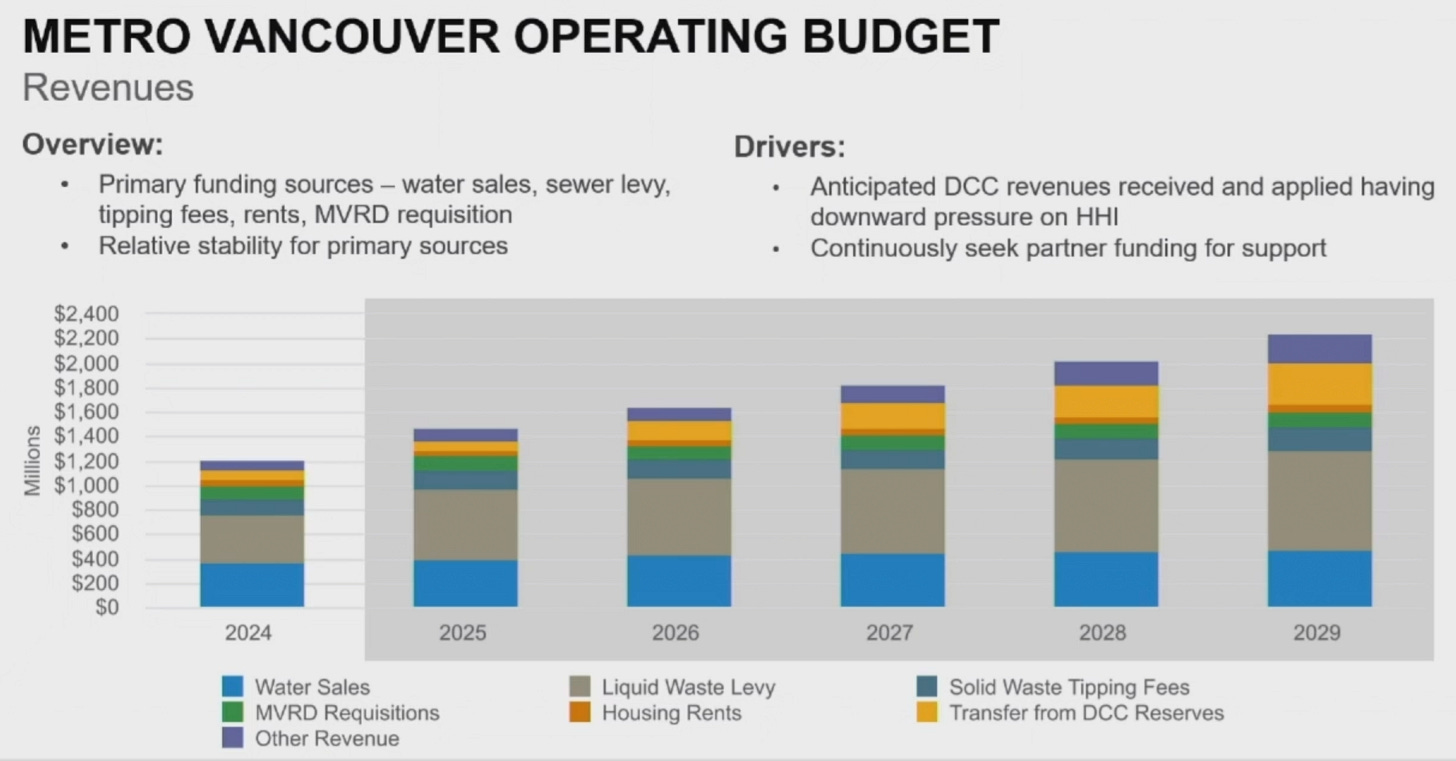Proposed Metro Van increase on property owners: $90/year. On renters trying to find a place: $600/year.
Yesterday's budget workshop
Besides municipal governments, we also have a regional government. The Metro Vancouver Regional District is responsible for water and sewer infrastructure across the metro area.
There was a Metro Vancouver budget workshop yesterday. It’s a good illustration of how local governments keep ratcheting up prices and rents.
A comparison:
Metro Vancouver levies and taxes expected to jump 10% in 2025. Glenda Luymes, Vancouver Sun.
Metro Vancouver is planning to significantly raise its Development Cost Charges (DCCs) on new housing. Coriolis analyzed the impact: Evaluation of Potential Financial Impacts of Metro Vancouver DCC Rate Increases on New Urban Development Projects. They found that this would raise rents for purpose-built rental projects by about 2-3%.
What does this translate into?
The “10% jump” is an increase of $80/year for the average household, to $875/year, for Metro Vancouver services: drinking water, wastewater treatment, and solid waste management (i.e. garbage pickup).
When new housing is expensive, existing housing is also expensive. If the average asking rent on a 1BR apartment in the city of Vancouver is $2750/month, a 2-3% increase translates to an additional cost of $600-$1000/year.
Metro Vancouver is trying to hold down costs for property owners by taxing new housing more heavily. This is their explicit strategy:
The yellow is showing the DCCs. The DCC revenue starts to ramp up from 2025 into 2029, which helps us maintain that annual household increase at 5% into the future on average.
There’s no free lunch: the additional money has to come from somewhere. Initially, cost increases can be absorbed by “land lift.” But once that’s gone, projects halt until prices and rents rise further. In other words, the cost increases end up being paid by renters and first-time homebuyers.
At the budget workshop, the Metro Vancouver CAO pointed out that there’s other factors driving up costs, not just the DCCs.
Of course I would argue that when we desperately need more housing, local governments should be countering these headwinds by reducing their charges (as the federal government is doing, by waiving GST on new purpose-built rental housing), not increasing them. Indeed, at the workshop, some councillors pushed back, asking if it’s possible to postpone the increases. But the problem is, they need the money.
From the Coriolis analysis
Previously
Two requests to Metro Vancouver Regional District. A presentation I did last November. If I understand correctly, staff is still looking at the possibility of waiving DCCs for rental projects that include 20% below-market rentals; they’re planning to bring forward a proposal in early 2025.
Municipal finance ideas. If ratcheting up prices and rents is a terrible idea, where else are local governments supposed to get the money?









I still can't believe that Dobrovolny quote from last year "The DCCs will not change housing prices."
DCCs are clearly having an effect on housing prices and development. It's insane that we still see these high-ranking city and regional government officials coming out and downplaying the effects while they raise the fees dramatically, again.